Throughout the '90s, the Legendary Pink Dots had a phenomenal dub-influenced bassist and drummer named Ryan Moore, whose massive input on the band's live tour had turned their appearances into must-see events. By the end of the decade, however, Moore's own reggae dub side-project, Twilight Circus, was gaining traction as a full-time vehicle, and Moore was getting his own interview coverage in magazines and on websites. The only reason why I bring him up now is because, when asked about whether or not he ever listened to the Dots' earlier material, the only album he admitted to liking was 1983's Curse.
Curse
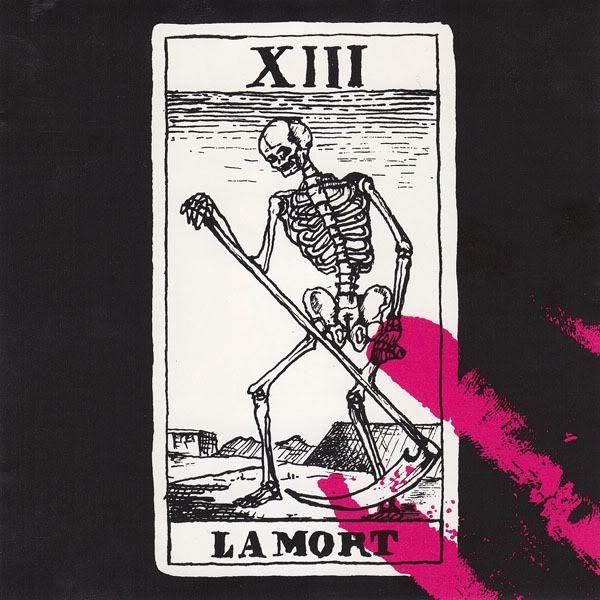
The band's relationship with Pat Bermingham's In Phaze label, which had begun with the debut LP Brighter Now, continued with its proper follow-up Curse, an altogether bigger and badder record. And perhaps due to the reception of the debut amongst certain post-punk subcultures, it is certainly much more goth, even featuring one of the most capital-G GOTH! album covers produced in the '80s. Creatively, this one is all over the place with a mix of old and new material, but it avoids the instantly-dated sound of its gentle predecessor by playing up the full-band arrangements on more than half the tracks while cutting back the overt electronic experimentation. Themes include many of the usual concerns, such as therapy and introverted insecurity, violent social outbreaks, two songs performed entirely in a made-up language, sexual obsession, and of course death death death: a soiree wherein the hostess kills all of her guests, an antagonist attempting to make planes crash with simple gestures, and a little girl gleefully setting fire to her toys—or is it a woman burning her family alive? At times grim, often funny, and always a little bit strange, Curse matches a cynical worldview with a wide range of sonic textures to produce the band's first quintessential release.
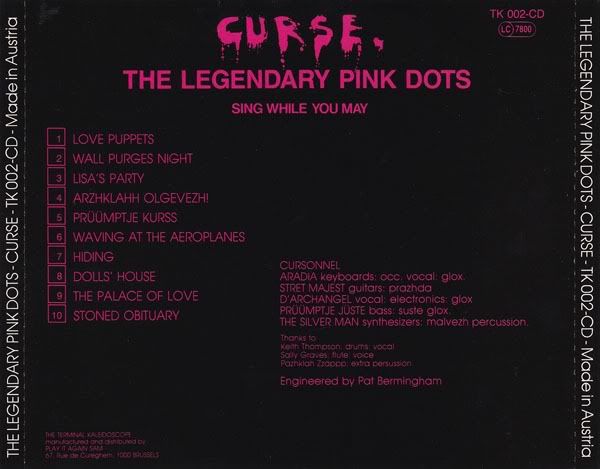
First CD edition of Curse tray card (above) and disc (below)
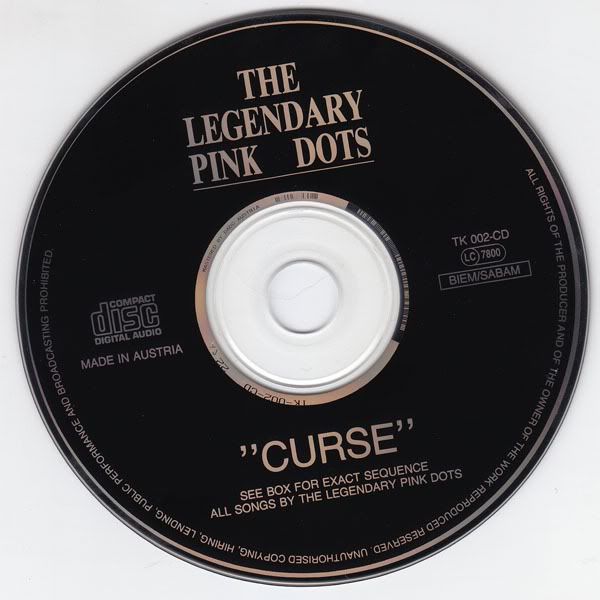
The album effectively buries Brighter Now in the dirt. Which is a difficult thing for me to say, actually, since that record has its own charms. But where the debut was instantly dated, this one has a greater variety of sounds and production gimmicks and, as I mentioned before, better use of full-band arrangements. The first record also felt as if it were showcasing a very particular version of the Dots, as it leaves behind a bit of a fantasy aftertaste. While this one is dressed up in goth clothes, the actual contents of the record demonstrate so many wonderful and crazy aspects of this band that it paints an overall clearer portrait of what the Dots do—a greater palette of colors, perhaps. And last but not least, song for song Curse is simply better. Brighter Now contains one inescapably massive song in their developing oeuvre ("Hanging Gardens") with a number of respectable but limited contenders. Curse contains two similarly massive tracks, while most of the others at least attempt to expand the listener's expectations.
The twin pillars upon which Curse is built are the opening and closing tracks. "Love Puppets" is such a huge milestone for the band that it's hard to describe without hyperbole. Effectively, it is the first tripped-out mindwarp in the Dots' canon. They had certainly tried before, but had never quite achieved the right balance of sound that would allow a song's production to enhance its psychoactive effects rather than constrain them. Nearly 30 years later, however, this one still takes your brain on a journey. The missing ingredient? SPACE. From one listen, it is obvious that the Dots have adjusted their approach by slowing things down and stripping away some of the layers. Edward Ka-Spel already sounds deeper and more mature here, and there's an allure to his voice that isn't evident on the earliest tapes. Guitar and synth no longer fight for the top of the mix; the instruments take their turns waiting for one another, and each is used in such a way to maximize impact. Sure, the track begins in familiar territory: after a couple of disembodied breaths, we're assaulted by Ka-Spel's backwards ranting while a squelchy synth spins in place. But the noise cuts out after a mere 40 seconds, allowing the spotlight to focus on the deliberate lyrics. Ka-Spel poetically relays his frustration with endless therapy sessions ("What gives you the right to analyze? You paralyze me with your probing. In the end I just agree... Maybe we're just puppets after all") and rhetorically asks the therapist to marry him in order to hurry things along. It's a sad but beautiful song that underscores not just the desperation in loneliness but also the frustrated state of mind that can cause it. Meanwhile, the synths continue to minimally plink along a four-note pattern occasionally interspersed by shards of guitar or even accompanied by whispers of backward guitar lines. The best bit is the interlude that begins about four and a half minutes in, wherein the synth tones gradually widen and evolve over numerous echo-laden (and creepy) effects; just when everything falls to silence, a sequenced drum pattern grows out of the quiet and threatens to overtake the song in a way that it never does. This is a typical example of the restraint the band has finally learned, and this passage, which might have been a song all by itself on an earlier release, marks the band's most sophisticated moment to this point.
The closing song, "Stoned Obituary," is ironically not a similar head trip, despite its title and thoroughly psychedelic lyrics. Though the double entendre might be intentional, the song is literally about a man who has been crucified and stoned... Whether or not this Man is supposed to be Jesus is still somewhat enshrouded (sorry) in mystery, as the song is told from the perspective of an onlooker who may have known Him, and there are numerous references to modern society that didn't exist in Biblical times (cameras, ice creams, the French national anthem, etc.) Anyhow, we've seen this song in its earliest, most straightforward form on Prayer for Aradia, and we watched it evolve into a multi-part suite on Kleine Krieg. Now the song gets significantly beefed up by its production values, gaining a much more solid vocal performance, a variety of underlying textures that differ distinctly from one another, and an incising guitar-based midsection that elevates the dramatic impact of the song right before the Man dies and all hell (heaven?) breaks loose. In fact, the song is so progressive in its ever-changing structure that all twelve minutes of it have never been properly tracked together on CD; it has always (mistakenly) been split into two parts.
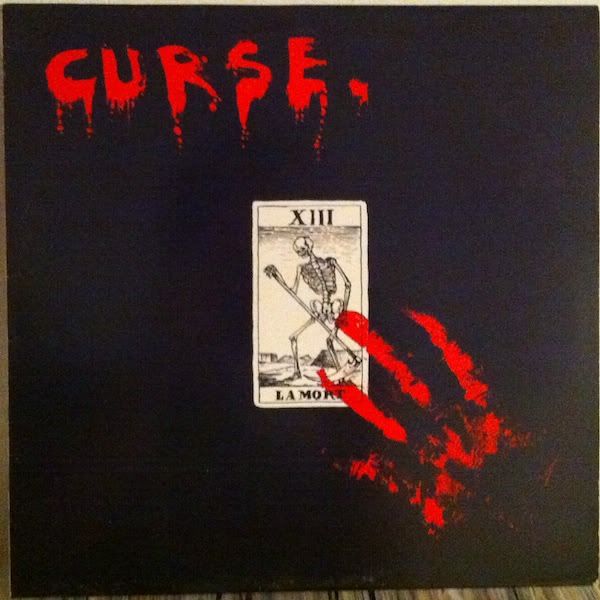
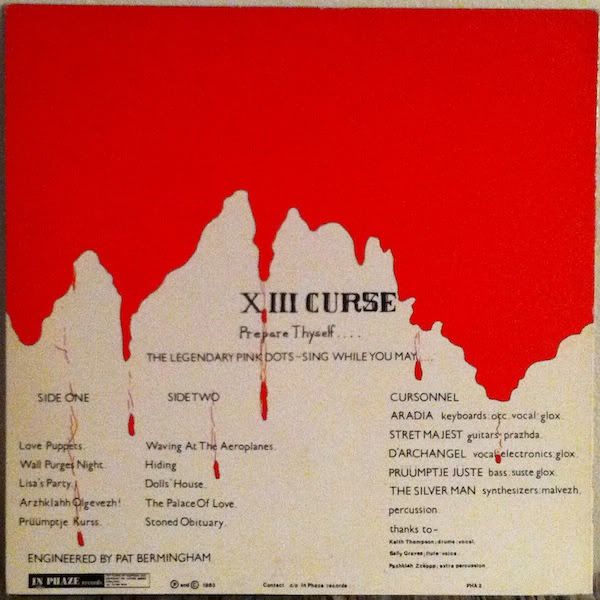
Curse original vinyl cover (above) and labels (below)
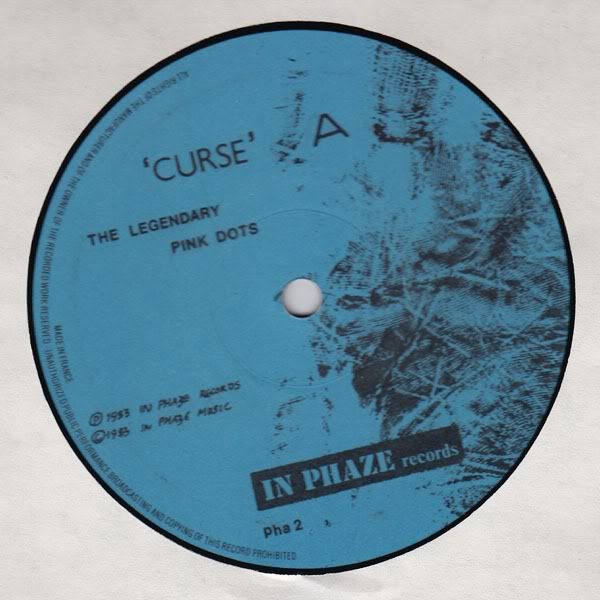
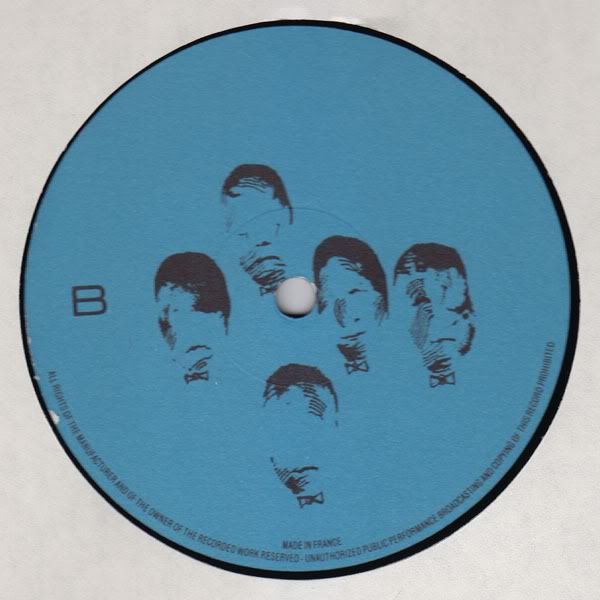
"Love Puppets" and "Stoned Obituary" make such significant bookends because the former really does appear to be opening the door to the future while the latter closes a chapter of the past. The other songs between these two monuments cover a range of styles while remaining considerably closer to the pop end of the spectrum. "Wall Purges Night" glides along on a simple rhythm that occasionally breaks for spoken choruses, but its most surprising aspect is that it is a duet between Ka-Spel and drummer Keith Thompson. Hearing another male sing lead on a Dots record is oddly shocking. The song title is a play on Walpurgis Night, the pagan party day related to May Day on which many European countries celebrate with drinks and bonfires. Instead, the song plays up the "purge" concept, recounting three or four atrocities in which people in power made "cannon fodder" of those beneath them. The recurring motif ("Enlightenment comes with a blast!") is both catchy and thought-provoking, but the song itself is a pretty simple attempt at new wave. "Lisa's Party" is the first appearance of Lisa on a Dots record. She will reappear frequently over the next few years. Somewhere along the line, Ka-Spel has admitted in at least one interview that Lisa acts as a sort of alter ego for him, which really raises the question of whether or not she's supposed to be a heroic figure. The song is charming synthpop with a bouncing bassline, which masks the grim punchline: an extravagant party of poetry and circus arts turns deadly when the guests are all poisoned. What is unclear about the song is whether or not the guests deserve what they get. This is followed by another song that maintains the upbeat tempo (driven by a sort of slap bass!), yet is almost willfully weird and meaningless. Ka-Spel speaks in tongues throughout the verses of "Arzhklahh Olgevezh!" At first he's kind of jolly, then he growls, then he shrieks. Amongst all of this is the equally humorous and heartbreaking chorus, sung by April Iliffe (aka Aradia): "No one understood him, no one understood him at all!" In fact, Ka-Spel's language—mostly an odd blend of English and Dutch that looks Slavic and sounds Russian—would subsequently appear on every LPD release after this one, usually as a comment in the liner notes meant to sum up the album or as an unidentifiable credit role. The language also dominates the two-minute "Prüümptje Kurss," an epilogue of sorts to the last song and the only thoroughly experimental song on the record. Ka-Spel's atonal foreign lament is backed by a variety of spacy effects; my best memory of this one is that it used to scare the hell out of my roommate's cat.
The second half of the record opens with the album's slightest song, "Waving at the Aeroplanes." It's another grim pop song, but it superficially betrays this fact with the same sort of hippie instrumentation that dominates Brighter Now, complete with bongos. For the most part the song would be the last of its sort on a Dots album. It ends with a crash, followed by "Hiding," another hideous poem by Sally Graves, who also appeared on Traumstadt 1. She says, "Look at me, touch me; I'm human and awkward, longing to be found, incapable of exposing myself." I certainly don't mean to downplay this bit's importance in the overall theme of the record, but I'm fairly certain we all feel like this until we lose our virginity. Thankfully, Sally only wastes a minute of our time before we move into a remarkably improved version of "Dolls' House." For those keeping score, this song is on Ancient Daze, Chemical Playschool 1+2, and Kleine Krieg in an earlier form that is nearly ruined by an overzealous performance on primitive keyboards. The maddening chords that drive the song are newly buried in the mix, bringing out the rhythm (especially the bass) and adding a lot of space. The song now feels sculpted and dramatic; as with "Stoned Obituary," Ka-Spel's performance is infinitely more nuanced. "Dolls' House" warrants an award for the most improved reworking of an earlier track, but it is still cloying and therefore overshadowed by the better songs on the album, including the next one. A weird edit occurs between the two songs, in which we hear a few seconds of an instrumental synth track which then cuts into a slurred loop of children laughing and playing. Then another arpeggiated synth track fades in called "The Palace of Love." This pretty little song houses one of Ka-Spel's all-time best vocal performances, as his intensifying enthusiasm as the song progresses ends up conveying so much more than the actual words.
The high points that Curse reaches are an early benchmark for the Dots, and in the long run, it's not hard to see why Ryan Moore may have singled it out amongst the early crop of releases. In the mid/late '80s after the band's international fame started to boom, the album was reissued on vinyl and for the first time on CD by the band in conjunction with their label at the time, Belgium's Play It Again Sam. Curse finally received an official U.S. release in 1996, when it was reissued by Soleilmoon Recordings and given terrible new (more gothy but less Dotsy) cover art, as seen below.
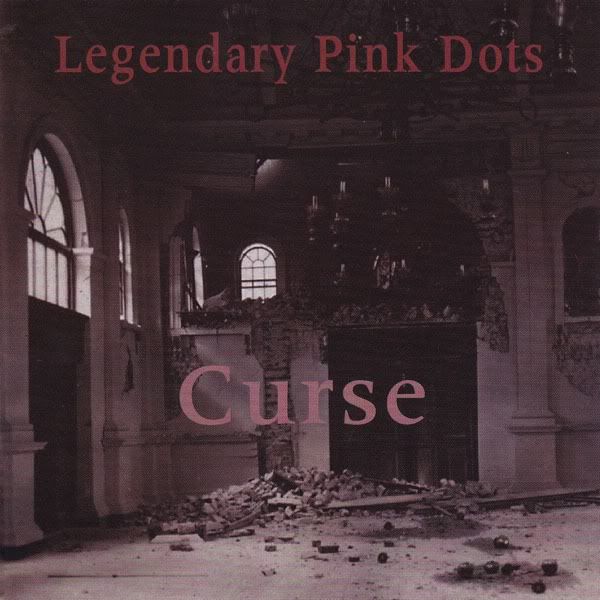
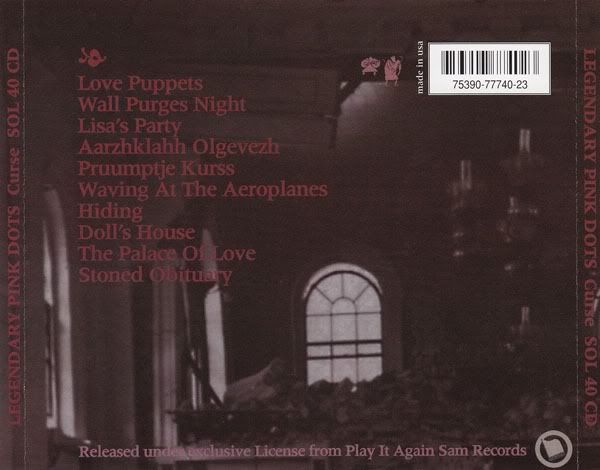
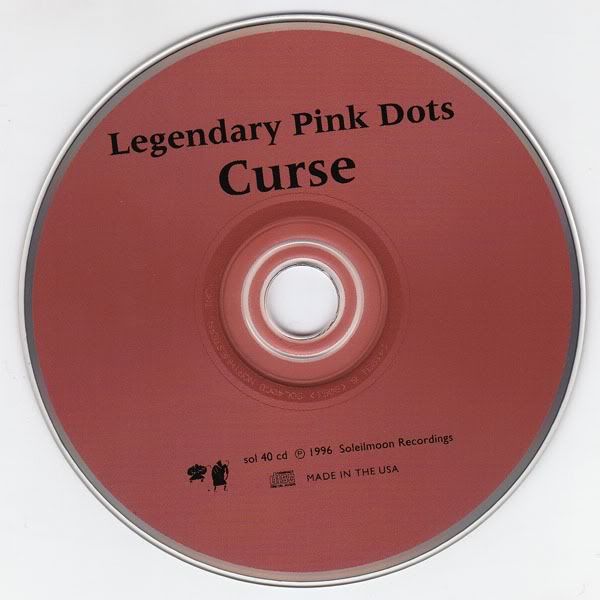
Next up, the Legendary Pink Dots released two more cassette releases in 1983. The first, Basilisk, plays like the flipside to Curse's creation, and includes a couple of outtakes from the album.
<----- GO BACKWARD to Prayer for Aradia

No comments:
Post a Comment